Before you get started with this article, you may want to read the first part, My Olympic Weightlifting Career. This is a continuation of my lifting career.
For the next 22 years, I continued weightlifting. I could never match the heavy weights I had lifted in the past, and I had to make a lot of changes in my training program. Eventually, the tendonitis in my knees subsided, and I learned to train smarter. I made a few comeback attempts to compete again, but I couldn’t accept not being able to lift as much as I used to, and I would eventually lose motivation.
In 2010 my seventeen-year-old son expressed an interest in weightlifting. I taught him how to do the Olympic lifts and coached him in several meets. We started training together, and my motivation and enthusiasm increased. The next thing I knew, I was squatting 400 pounds, something I hadn’t done since I stopped competing 22 years earlier.
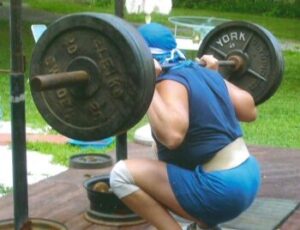
My Start Into Powerlifting
One day, I was reading the local town newspaper and saw an ad for an upcoming powerlifting contest. It was called the Mighty Christian Powerlifting Contest, and it was an unsanctioned meet about three miles from my home.
I never had much interest in powerlifting, and all through my years of competing in Olympic lifting, I had never done deadlifts and rarely did bench presses. But I knew I could squat some pretty big weights, so I thought, why not give this a try? What have I got to lose?
In all my years of competing in Olympic lifting, I had trouble gaining weight, but now, at 49 years old, I was having the opposite problem. At this contest, I weighed in at 220 pounds.
I made my opening squat attempt with 405 pounds. I asked for 415 pounds for my second attempt and took a seat while the loaders got the bar ready. But as I looked up, I saw them stripping the bar down to 135 pounds. I ran over there and said wait, what are you doing? I asked for 415 pounds. Why are you lowering the weight to 135?
They explained to me that after everyone takes their first attempt, we strip the bar and start the second attempts.
I was completely thrown off by this because this is not the way we do it in Olympic lifting. In Olympic lifting, they just keep increasing the weight. This way, no one has to wait an extremely long time in between their attempts.
So, needless to say, I had to wait a long time before the weight got to 415 pounds. I had to do my warm-up session all over again, but I managed to have a successful second attempt. After another long wait, I succeeded on my third attempt with 425 pounds.
The bench press was a lift I had little interest in and hadn’t trained that hard for. I made my opener with 250 pounds and then missed 260 pounds twice.
In the deadlift, I opened with an easy 425. I then made 440 on my second attempt and 450 on my third. I walked out of there feeling pretty satisfied. It felt good to compete again, and I thought maybe I’d do this again.
In December, I competed in Holbrook Long Island. All the heavy lifting caused me to gain weight, and I weighed in at 228 pounds. I squatted 420 pounds on my second attempt, but I started to feel some pain in my knee, so I played it smart and passed on my third attempt. I benched 255 and missed 260.
I deadlifted 465 pounds on my second attempt and had 475 pounds locked out on my third attempt, but I lost my grip and dropped the bar. I had increased my total from eight months earlier by 15 pounds, so I was happy.
In March of 2012, I competed in East Rutherford, NJ. This contest would be a little different because I was doing deadlift only, or at least that was the plan. I weighed in at 220 and made all three attempts, finishing with 480 pounds.
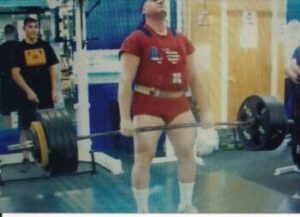
Trying Out More Contests
But there was another contest immediately following the deadlift. The objective was to squat your body weight for as many reps as you could do in 90 seconds. I was 17 days away from my 50th birthday, and I wasn’t planning on taking part in this, but the challenge was too tempting to pass up.
I had the advantage of being the last lifter to go. The guy who was currently in first place did 24 reps, so I needed to do 25. Although high reps were not my thing, this was only 220 pounds, so I figured I could knock out 25 reps without too much trouble.
The mistake I made was that I was too concerned about the 90-second timer. I banged out 15 reps as fast as lightning, but then I started to struggle, not because it started to feel heavy, but because I wasn’t used to high reps, and I was simply running out of gas. By the time I got to 20 reps, I was gasping for air.
The crowd started cheering me on, and that really helped. I barely made it to 25, but by the grace of God, I finished and won first place. I promised myself I would never do that again.
Seven weeks later, I competed again at the Mighty Christian Powerlifting Contest in Dover, NJ. I weighed in heavy at 232 pounds. I squatted 420, benched 260, and deadlifted 480 on my second attempt. I attempted 500 on my third attempt, but I couldn’t get the weight past my knees.
In August, I competed in Allentown, PA. Weighing in at 227, I made all three attempts on the squat, 400, 420, and 430. I made my usual token bench press with 255. On the deadlift, I made 485 on my second attempt, which gave me another chance at 500.
I had it locked out, but the judges turned the lift down, stating that there was a slight hitch. As I was locking it out, I started losing my grip, so I probably did hitch it to prevent dropping the bar.
In January 2013, I competed in Newark at the New Jersey Championships.
My body weight was now up to 242 pounds, but not because I wanted it to be. I squatted 430, benched 260, and deadlifted 490. My squat and deadlift were both State records for my age group.
I had planned on attempting a 500 deadlift on my third attempt, but I was unsuccessful on my second attempt with 490 because I once again had trouble with my grip. I took 490 again on my third attempt, using a different grip, and made it.
A New Grip
Up to this point, I was using a hook grip. For those who don’t know what a hook-grip is, it simply means that you tuck your thumbs under your forefingers. This is the grip used by Olympic Weightlifters, and although I was now powerlifting, I wanted to stay true to my Olympic lifting roots.
But unless you have big hands, the hook grip doesn’t work so well for deadlifting. So I grudgingly switched my grip to the over/under grip used by the majority of powerlifters (one hand with palm facing up and the other hand with palm facing down).
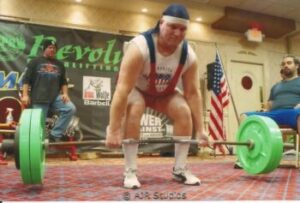
I would also like to point out that I never switched from an Olympic lifting squat (also known as a high bar squat) to a powerlifting squat (a low bar squat). While it’s true that you can squat more weight using the low bar technique, it’s also true that there is a much higher risk of injury. I always used the high bar technique, and I always hit a rock bottom position.
My Wife Was My Biggest Supporter
Three months later, I was back in Dover for the Mighty Christian Powerlifting Contest. I weighed in at 242 and squatted 435, the most I had done up to this point. I benched 265 and finally deadlifted 500.
Through it all, my wife, Sharon, supported and encouraged me. She decided to start training with me, and she made such good progress that she started competing with me.
In July, we competed on Long Island on a brutally hot day. The venue we lifted at had no AC or fans, but I was used to that from my years of training at the Belleville Barbell Club in New Jersey.
My wife lifted in the morning session and was successful on eight of her nine attempts.
After coaching her all morning in the heat and humidity, I wasn’t sure I was going to have anything left to compete, but the good Lord provided me with the energy I needed.
I weighed 238 pounds and lifted in the “Raw Division” (no knee wraps or special lifting gear). I squatted 200 kilos/441 pounds, which was a New York State record for my age group. I benched 265 and deadlifted 500 pounds for another New York State record.
In September, I competed in Newark and weighed 240 pounds. My wife competed too and again made 8 out of 9 lifts, I squatted 445 and deadlifted 505, both personal records and New Jersey State records in my age group. I still couldn’t bench-press, making only my opener with 255 pounds.
In January of 2014, I competed in Newark again. Since I already had the State records in the 110-kilo class, I wanted to see if I could break the records in the 125-kilo class. I weighed in at 244. I broke the squat record with a lift of 452.5 pounds and then broke the deadlift record with a lift of 510 pounds. These lifts were again done without knee wraps or any special lifting gear. I even increased my bench press to 275 pounds. My wife lifted in this meet, too, and did great, making 8 out of 9 lifts.
Three months later, I lifted in Dover. I benched 275, deadlifted 510, and increased my squat to 455. This contest was extra special because it was the only time that I, my son, and my wife all lifted in the same meet. We were joined by some friends and youngsters from a Police Athletic League we had been training at. Everyone had a successful meet, and we went to an all-you-can-eat Chinese restaurant afterward.

Earning State Records
My next competition was in October in Dover again. My body weight was now up to 252 pounds. I increased my bench to 280 and my deadlift to 525. I squatted 430 on my second attempt but had to pass on my third attempt due to a slight injury.
In January 2015, I was back in Newark. I equaled my best bench with 280 and my best squat with 455. I increased my deadlift record to 530.

Three months later, I was back in Dover. My body weight was now up to 260 pounds. Thirty-three years earlier, I had weighed 158 pounds. At that time, I couldn’t gain weight, no matter how much I ate. Now, I couldn’t stop gaining weight, no matter how little I ate. Anyway, I didn’t have my best day in the squat, lifting 430 pounds. My top bench was 275, but I did increase my deadlift to 535.
I competed in Dover again in October, and my body weight stayed at 260. I benched 275 and squatted 420, but I got my deadlift up to 550 pounds. The competitions in Dover were always my favorite because of the camaraderie of the lifters and the Christian fellowship.
In January 2016, I competed in Latham, NY (near Albany). I lifted my usual 275 on the bench but only squatted 402 due to some nagging injuries. I did manage to deadlift 245 kilos/540, which was another State record.
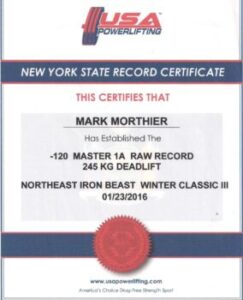
In April, it was back to Dover. I benched 280 and deadlifted 540. I squatted 435, which was the most I had done in over a year, so I was happy about that.
Three months later, I competed in Latham. My body weight held steady at 260. I benched my usual 275 and squatted 190 kilos/419 pounds. I deadlifted 227.5 kilos/501pounds on my opening attempt and then made 245 kilos/540 pounds on my second attempt, but the judges turned it down. I took 245 again on my third attempt and made what I thought was a good lift, but again the judges did not agree.
In October, I competed in Latham again and weighed 270, the heaviest I had ever been. I benched 285 and squatted 435. I was in great shape for the deadlift and had done 575 in training with straps. Someone had broken my New York State record, and I aimed to get it back. I opened with an easy 505, but again the judges turned me down. I was flabbergasted about why they kept turning down my deadlifts.
I had planned on taking 550 for my second attempt, but now I was so worried about the judges’ red-lighting me that I played it safe and repeated the 505 for three white lights. I was successful with 550 on my third attempt, but was a bit disappointed because I had planned on lifting 565 in this meet. But on the bright side, the 550 was enough to reclaim my State record.
Six months later, I competed in Morristown, NJ. My bodyweight was now up to 280 pounds which I wasn’t happy about, but it did enable me to increase my weak lift (the bench press) to 300 pounds. I squatted 430 and was again ready to deadlift some heavy weight. I had done 600 in training with straps two weeks before my 55th birthday.
I opened with an easy 505 and then went up to 560. The plan was to take at least 575 on my third attempt, but there was an issue with the bar. I didn’t notice it on my first attempt because the 505 went up easily. But as I was lifting the 560, I started losing my grip and realized that the bar was much thicker than a regular bar.
I tried it again on my third attempt, but the result was the same. It was disappointing because I know I could have done at least 560 if not for the problem with the bar.
With regards to my body weight, while I will admit that 280 pounds is a lot of weight to carry on a 5’ 8” body, and probably not all that healthy, one must understand that powerlifting builds up more muscle mass than Olympic lifting. The heaviest I ever weighed for an Olympic lifting contest was 193 pounds. But I was also only 27 years old, so yes, age is a factor.
In October, I competed in Latham, NY again. I had gone on a strict diet and got my body weight down to 252 pounds. I only benched 260, but I squatted 420 and deadlifted 515. Considering I had lost 28 pounds, I was satisfied with my results.
In April 2018, I competed in Morristown and weighed in at 258. I benched 285, squatted 425, and deadlifted 530.
I didn’t compete again for a full year. In April 2019, I competed in Morristown again. I benched 285 and deadlifted 525, but I held myself back in the squat due to some nagging injuries. I took 385 on my opening attempt and skipped my second and third attempts.
I have not competed since then, but I can’t say with 100% certainty that I’ll never compete again. I continue to lift weights and I can still deadlift well over 500 pounds at 62 years old, so you never know.
I would have to say that I had much more success in powerlifting than I ever did in Olympic lifting. It made me wonder if I should have been competing in powerlifting from the start. I was clearly a better powerlifter than I was an Olympic lifter, and I think I was built better for it.
All-Time Best Lifts
But despite that, I’ll never regret my eight years of competing in Olympic lifting. Not only did I make a lot of lasting friendships, but I definitely enjoyed Olympic lifting more than powerlifting.
But don’t get me wrong, I enjoyed my time competing in powerlifting too, and I have to thank my son Everett and my wife Sharon for training with me and keeping me motivated.
Here is a list of my all-time best lifts in training.
Full High Bar Back Squat – 210 kilos/462 pounds. Age 52. (No knee wraps)
Rock Bottom Front Squat – 196 kilos/432 pounds. Age 53. (No knee wraps)
Conventional Style Deadlift (with straps) – 272 kilos/600 pounds. Age 55 (no belt)
Bench Press (with pause) – 138 kilos/305 pounds. Age 55.
Incline Bench Press – 125 kilos/275 pounds. Age 57.

Please Share If You Liked This Article
Mark Morthier is the host of Yesterday’s Sports, a podcast dedicated to reliving memorable sports moments from his childhood days and beyond. He grew up in New Jersey just across from New York City, so many of his episodes revolve around the great sport’s teams of the 70s for the New York area.
He is also an author of No Nonsense, Old School Weight Training (Second Edition): A Guide for People with Limited Time and Running Wild: (Growing Up in the 1970s)
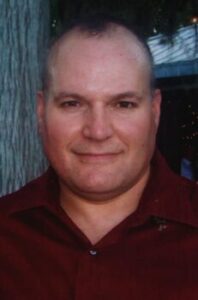
Please Note – As an Amazon Associate I earn from qualifying purchases
Resources
More From Yesterday's Sports
1972 Olympics Revisited (Weightlifting Medal Winners)
Weightlifting at the 1972 Olympics occurred in Munich, Germany, from...
Read More1968 Olympics Revisited (Weightlifting Medal Winners)
The 1968 Olympics were held in Mexico City in October....
Read More1968 Detroit Tigers (A Historic Championship Season)
With baseball season in full swing, I thought I’d take...
Read More(4 All-Time Weightlifting Greats) Paul Anderson, Tommy Kono, Ken Patera, and Naim Süleymanoğlu
Here’s a quick look at some of the accomplishments of...
Read More




